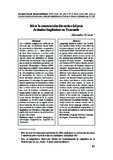Mostrar el registro sencillo del ítem
Sobre la construcción discursiva del país: actitudes lingüísticas en Venezuela
| dc.rights.license | http://creativecommons.org/licenses/by-nc-sa/3.0/ve/ | |
| dc.contributor.author | Álvarez Muro, Alexandra | |
| dc.date.accessioned | 2009-07-16T21:45:28Z | |
| dc.date.available | 2009-07-16T21:45:28Z | |
| dc.date.issued | 2009-07-16T21:45:28Z | |
| dc.identifier.issn | 1316-1369 | es_VE |
| dc.identifier.uri | http://www.saber.ula.ve/handle/123456789/28989 | |
| dc.description.abstract | Las actitudes lingüísticas reflejan las creencias que los hablantes tienen sobre las características dialectales ―regionales, sociales, étnicas, etc.― suyas propias y de otros. Estas creencias, a su vez, están fundamentadas en los valores grupales con los cuales los individuos se sienten identificados, lo cual incide sobre la opinión que tienen de los individuos que hablan esas variedades. Bentivoglio y Sedano (1999) relacionan las actitudes con la construcción de la identidad hispanoamericana, pues las investigadoras miden las reacciones de habitantes de Caracas y Madrid hacia diferentes dialectos americanos y peninsulares. La investigación mencionada mostró también que los caraqueños evalúan pobremente su propio dialecto y muestran una actitud crítica hacia su variedad; una serie de trabajos realizados en la región andina evidencian, en cambio, una valoración alta del dialecto regional, frente a una inferior del dialecto de la capital. Asimismo, se observa cómo el lenguaje delimita la frontera de la región andina hacia Colombia. En este estudio, hacemos una revisión de los estudios sobre actitudes lingüísticas en Venezuela, y buscamos una explicación en el contexto social e histórico en que ellas surgen. | es_VE |
| dc.language.iso | es | es_VE |
| dc.rights | info:eu-repo/semantics/openAccess | |
| dc.subject | Actitudes lingüísticas | es_VE |
| dc.subject | Ideologías lingüísticas | es_VE |
| dc.subject | Español de Venezuela | es_VE |
| dc.title | Sobre la construcción discursiva del país: actitudes lingüísticas en Venezuela | es_VE |
| dc.title.alternative | On the discursive construction of the country: Language attitudes in Venezuela | es_VE |
| dc.type | info:eu-repo/semantics/article | |
| dc.description.abstract1 | Language attitudes reflect the beliefs that speakers have of their own dialectal features–regional, social, ethnic, etc– of and those of others. These beliefs are based on group values with which individuals feel identified, which in turn incide on the opinion that individuals have of the speakers of these varieties. Bentivoglio and Sedano (1999), relate attitudes around the construction of Hispano-American identity, measuring the reactions of inhabitants of Caracas and Madrid towards different Latin-American and peninsular dialects. The study proves that Caracas speakers of Spanish evaluate poorly their own dialect and show a critical attitude towards their own variety. A series of studies carried out in the Andean region evidence, on the contrary, a high evaluation of Andean speakers of their regional dialect, and a lower evaluation of the dialect of the capital city. Language also delimits the frontier in the Andean region, away from the Colombian varieties. This study revises the studies carried out in Venezuela about language attitudes, and seeks for an ideological explanation in the social and historical context in which they emerge. | es_VE |
| dc.description.colacion | 87-106 | es_VE |
| dc.description.email | alvareza@ula.ve | es_VE |
| dc.description.frecuencia | semestral | es_VE |
| dc.identifier.depositolegal | 196602ME301 | es_VE |
| dc.subject.facultad | Facultad de Humanidades y Educación | es_VE |
| dc.subject.keywords | Language attitudes | es_VE |
| dc.subject.keywords | Language ideologies | es_VE |
| dc.subject.keywords | Venezuelan spanish | es_VE |
| dc.subject.publicacionelectronica | Revista Presente y Pasado | es_VE |
| dc.subject.seccion | Revista Presente y Pasado: Artículos | es_VE |
| dc.subject.thematiccategory | Artes y Humanidades | es_VE |
| dc.subject.tipo | Revistas | es_VE |
| dc.type.media | Texto | es_VE |
Ficheros en el ítem
Este ítem aparece en la(s) siguiente(s) colección(ones)
-
Presente y Pasado - Año 014 - Volumen 14. Nº 27
Enero - Junio 2009



